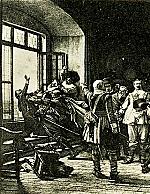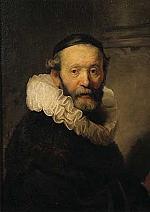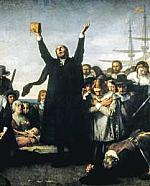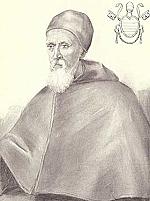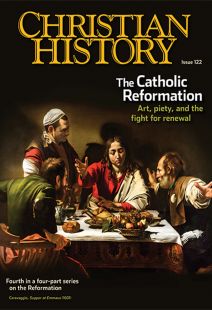Christian History Timeline: The Catholic Reformation
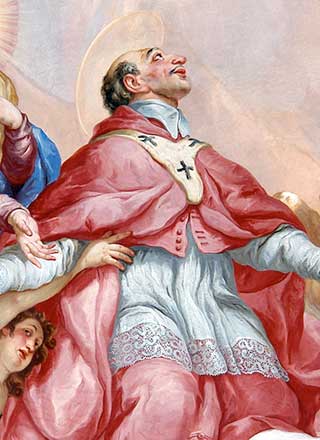
[Above: Borromeo; Wikimedia]
Color code: Red: Reformers; Green: Books and Culture; Orange: Church and State; Blue: World Events.
• 1440: Gutenberg invents the printing press.
• 1453: Turks capture Constantinople.
• 1476: Gian Pietro Carafa is born.
• 1478: Spanish Inquisition begins.
• 1483: Martin Luther and Gasparo Contarini are born.
• 1492: Columbus makes first voyage to the Americas.
• 1498: Girolamo Savonarola is burned at the stake in Florence.
• 1500: Reginald Pole is born.
• 1509: John Calvin is born; Henry VIII becomes king.
• 1512: Fifth Lateran Council begins.
• 1513: Leo X becomes pope.
• 1515: Teresa of Ávila and Philip Neri are born.
• 1517: Fifth Lateran Council ends; Luther writes 95 Theses.
• 1519: Eck debates Karlstadt and Luther at Leipzig; Charles I of Spain is elected Holy Roman Emperor Charles V.
• 1520: Papal bull gives Luther 60 days to recant; Luther burns papal bull and canon law.
• 1521: Luther excommunicated; Leo X titles Henry VIII “Defender of the Faith.”
• 1522: Hadrian VI becomes pope.
• 1523: Clement VII becomes pope.
• 1524: Carafa helps found the Theatines; Diet of Nuremberg fails to enforce Edict of Worms.
• 1527: Imperial troops sack Rome.
• 1529: Name Protestant first used; Second Diet of Speyer enforces Edict of Worms; Turks lay siege to Vienna.
• 1530: Diet of Augsburg attempts to end division.
• 1531: Schmalkaldic League forms against Charles V.
• 1532: Diet of Regensburg and Peace of Nuremberg guarantee religious toleration.
• 1533: Thomas Cromwell declares Henry VIII’s marriage to Catherine of Aragon null and void.
• 1534: Ignatius Loyola and others pledge themselves to fellowship; Henry VIII declares himself supreme head of the Church of England; Paul III becomes pope.
• 1535: Thomas More is executed; Ursuline religious order is founded; Charles V forms Catholic Defense League.
• 1536: Pope Paul III commissions a report on abuses in the church.
• 1538: Charles Borromeo is born.
• 1540: Society of Jesus (Jesuits) is formed; conferences at Haguenau and Worms fail to reconcile Protestants and Catholics.
• 1541: At Colloquy of Regensburg, Melanchthon and Bucer reach agreement with Catholics on most doctrines, but Luther and Rome reject their work.
• 1542: John of the Cross is born; Robert Bellarmine is born; Gasparo Contarini dies; Francis Xavier sails for India; Carafa persuades Paul III to set up the Roman Inquisition.
• 1543: Copernicus writes that the earth revolves around the sun.
• 1545: Council of Trent convenes.
• 1546: Martin Luther dies.
• 1546–1547: Schmalkaldic War is fought between Protestant and Catholic territories in Germany.
• 1547: Edward VI succeeds Henry VIII.
• 1548: “Armed Diet” attempts to nullify Lutheran reforms; many Catholic and Protestant leaders refuse to accept Augsburg Interim; Ignatius’s Spiritual Exercises is published.
• 1549: Francis Xavier reaches Japan.
• 1550: Julius III becomes pope.
• 1552: Francis Xavier dies; Council of Trent is suspended and will not meet again until 1562.
• 1553: Mary I succeeds Edward VI.
• 1555: Mary burns Latimer and Ridley at the stake; Peace of Augsburg allows German rulers to determine religion of their regions;Marcellus II becomes pope but dies 22 days later; Carafa becomes pope as Paul IV.
• 1556: Ignatius of Loyola dies.
• 1558: Elizabeth I succeeds Mary I.
• 1559: Final edition of Institutes is published; Pius IV becomes pope.
• 1560: Scottish Parliament abolishes Catholicism in Scotland.
• 1562: Teresa of Ávila establishes the first Discalced Carmelite convent.
• 1563: Thirty-Nine Articles drafted by the Church of England; Council of Trent concludes.
• 1565: Charles Borromeo goes to Milan as archbishop; Pius V becomes pope.
• 1566: Teresa publishes The Life of Saint Teresa of Ávila by Herself.
• 1567: Francis de Sales is born.
• 1568: John of the Cross establishes Discalced Carmelite order for men.
• 1564: John Calvin dies.
• 1572: Gregory XIII becomes pope.
• 1575: Philip Neri founds Congregation of the Oratory.
• 1577: Teresa of Ávila writes Interior Castle; around this time John of the Cross begins “Dark Night of the Soul” and Ascent of Mount Carmel.
• 1580: Edmund Campion arrives in England as a Jesuit missionary.
• 1582: Teresa of Ávila dies; Gregorian calendar is introduced by Pope Gregory XIII.
• 1585: Sixtus V becomes pope.
• 1590: Urban VII becomes pope, dies after 12 days and is succeeded by Gregory XIV.
• 1591: John of the Cross dies; Innocent IX becomes pope.
• 1592: Clement VIII becomes pope.
• 1595: Philip Neri dies.
• 1603: James I succeeds Elizabeth I.
• 1616: The church forbids Galileo to teach the Copernican theory.
• 1618: Thirty Years’ War begins.
• 1621: Robert Bellarmine dies.
• 1625: Charles I succeeds James I.
• 1629: Emperor Ferdinand II issues Edict of Restitution.
• 1633: Galileo is called before the Roman Inquisition.
• 1642: English Civil War begins.
• 1648: Peace of Westphalia concludes Thirty Years’ War and Eighty Years’ War.
• 1649: Charles I is executed.
• 1660: The monarchy is restored in England.
This article is from Christian History magazine #122 The Catholic Reformation. Read it in context here!
 Christian History’s 2015–2017 four-part Reformation series is available as a four-pack. This set includes issue #115 Luther Leads the Way; issue #118 The People’s Reformation; issue #120 Calvin, Councils, and Confessions; and issue#122 The Catholic Reformation. Get your set today. These also make good gifts.
Christian History’s 2015–2017 four-part Reformation series is available as a four-pack. This set includes issue #115 Luther Leads the Way; issue #118 The People’s Reformation; issue #120 Calvin, Councils, and Confessions; and issue#122 The Catholic Reformation. Get your set today. These also make good gifts.
By the editors
[Christian History originally published this article in Christian History Issue #122 in 2017]
Next articles
Defender of God’s justice
Arminius questioned some aspects of Reformed faith, but he never meant to launch a movement
William den BoerRemaking the world
Five men with very different ideas on the reform of Sixteenth-century Catholicism
Edwin and Jennifer Woodruff TaitSupport us
Christian History Institute (CHI) is a non-profit Pennsylvania corporation founded in 1982. Your donations support the continuation of this ministry
Donate



